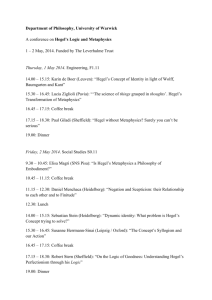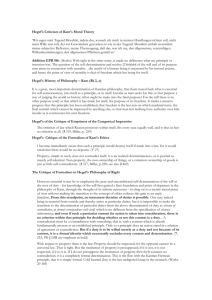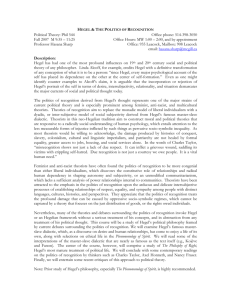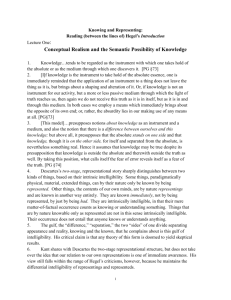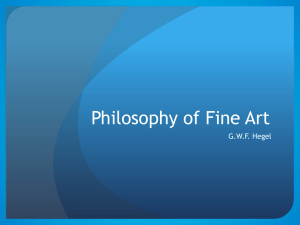Hegel: Glossary - University of London
advertisement
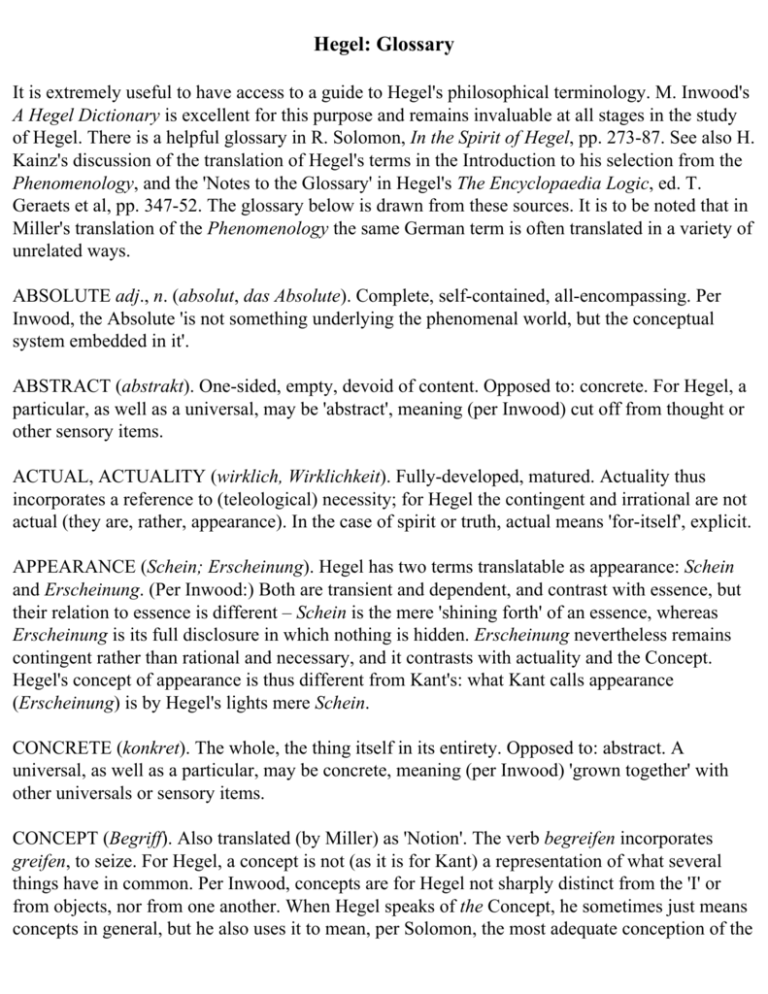
Hegel: Glossary It is extremely useful to have access to a guide to Hegel's philosophical terminology. M. Inwood's A Hegel Dictionary is excellent for this purpose and remains invaluable at all stages in the study of Hegel. There is a helpful glossary in R. Solomon, In the Spirit of Hegel, pp. 273-87. See also H. Kainz's discussion of the translation of Hegel's terms in the Introduction to his selection from the Phenomenology, and the 'Notes to the Glossary' in Hegel's The Encyclopaedia Logic, ed. T. Geraets et al, pp. 347-52. The glossary below is drawn from these sources. It is to be noted that in Miller's translation of the Phenomenology the same German term is often translated in a variety of unrelated ways. ABSOLUTE adj., n. (absolut, das Absolute). Complete, self-contained, all-encompassing. Per Inwood, the Absolute 'is not something underlying the phenomenal world, but the conceptual system embedded in it'. ABSTRACT (abstrakt). One-sided, empty, devoid of content. Opposed to: concrete. For Hegel, a particular, as well as a universal, may be 'abstract', meaning (per Inwood) cut off from thought or other sensory items. ACTUAL, ACTUALITY (wirklich, Wirklichkeit). Fully-developed, matured. Actuality thus incorporates a reference to (teleological) necessity; for Hegel the contingent and irrational are not actual (they are, rather, appearance). In the case of spirit or truth, actual means 'for-itself', explicit. APPEARANCE (Schein; Erscheinung). Hegel has two terms translatable as appearance: Schein and Erscheinung. (Per Inwood:) Both are transient and dependent, and contrast with essence, but their relation to essence is different – Schein is the mere 'shining forth' of an essence, whereas Erscheinung is its full disclosure in which nothing is hidden. Erscheinung nevertheless remains contingent rather than rational and necessary, and it contrasts with actuality and the Concept. Hegel's concept of appearance is thus different from Kant's: what Kant calls appearance (Erscheinung) is by Hegel's lights mere Schein. CONCRETE (konkret). The whole, the thing itself in its entirety. Opposed to: abstract. A universal, as well as a particular, may be concrete, meaning (per Inwood) 'grown together' with other universals or sensory items. CONCEPT (Begriff). Also translated (by Miller) as 'Notion'. The verb begreifen incorporates greifen, to seize. For Hegel, a concept is not (as it is for Kant) a representation of what several things have in common. Per Inwood, concepts are for Hegel not sharply distinct from the 'I' or from objects, nor from one another. When Hegel speaks of the Concept, he sometimes just means concepts in general, but he also uses it to mean, per Solomon, the most adequate conception of the world as a whole. Per Geraets et al, the Concept refers to the movement of logical thinking in its self-comprehension. Solomon suggests that for Hegel the Concept sometimes has the force of 'our conception of concepts', and that it may also refer to the process of conceptual change, since for Hegel the identity of concepts is bound up with dialectical movement. Inwood suggests that Hegel sometimes assimilates the Concept to God. Kainz glosses the Concept as a 'grasping-together of opposites'. CONSCIOUSNESS (Bewußtsein). Note that Hegel sometimes uses consciousness as a generic term for cognitive awareness, of which self-consciousness is one species; and sometimes as a species of consciousness in the generic sense, where it contrasts with self-consciousness. DETERMINE, DETERMINATION, DETERMINATE, DETERMINACY/DETERMINATENESS (bestimmen, Bestimmung, bestimmt, Bestimmtheit). To determine something is to conceptualise, articulate, identify, particularise, specify it. Solomon suggests that the term plays a similar role in Hegel to 'constitute' in Kant. Determination and determinacy presuppose negation – i.e. (Inwood:) a thing is determinate only in so far as it contrasts with other things or concepts which are determined in a way in which it is not. The determinacy of a thing consists in its features, in the broadest possible sense. DIALECTIC (Dialektik). The form of movement of concepts, in which development takes place through opposed or contradictory stages. The development in question pertains to the subjectmatter of the Phenomenology, i.e. to forms of consciousness, and it is internal to them: it is selfdevelopment through self-criticism. Per Inwood, dialectic involves three steps: (1) one or more concepts are taken as fixed, sharply defined and distinct from one another = stage of understanding; (2) through reflection on them, a contradiction or contradictions emerge = stage of dialectical reason; (3) the result is a higher concept which embraces the earlier ones and resolves their contradiction = stage of speculative reason. Hegel thus inverts Kant's sense of dialectic as a logic of illusion. Geraets et al distinguish a broad use of dialectic, to refer to the entire movement of the self-articulation of thought, from a narrower use, which refers to the self-negations of the understanding. ESSENTIAL, ESSENCE (wesentlich, Wesen). The essence of a thing is what it really is, the thing in itself, its conceptual core. Essence contrasts with 'being' in a wide sense, and with appearance. In so far as essence is indeterminate, it is 'other than' appearance; in so far as it becomes determinate, the relation of essence to appearance is reciprocal, they are correlates. In application to consciousness, essence means (per Pinkard) its kind of rationality. EXPERIENCE (Erfahrung). In the Phenomenology, experience refers to the experience of consciousness on its way to Science. It does not have the usual implication of restriction to the sensory but rather hinges on thought; so it does not mean for Hegel what it means for the empiricists or for Kant. Hegel originally planned to give the Phenomenology the title 'Science of the Experience of Consciousness'. FOR ITSELF (für sich). Reflective, explicit, self-comprehending, fully developed (Miller often translates für sich as 'explicit'). Contrasts with: in itself, in-and-for-itself. IDEA (Idee). The unity of object and Concept; reality as sublated. The Idea is associated with the infinite, and equivalent to the Absolute. IMMEDIATE, IMMEDIACY (unmittelbar, Unmittelbarkeit). More usually in Hegel, a characteristic of things rather than an epistemological term, meaning: intuitive, naive, undeveloped, not worked through; simple, given, elementary, initial, unrelated to other things. Opposed to: mediate, mediation. IN ITSELF (an sich). Merely potential or implicit (Miller often translates an sich as 'implicit'). Something is 'in itself' when it is considered separately from other things, and (in the case of a form of consciousness) when it is unreflective. That is why, for Hegel, the in itself is mere potentiality: actuality requires determination, negation, relations with other things. Note that a thing may be 'in itself for us' (an sich für uns), an expression Hegel uses often: this just means that we are considering it as it is separate from other things. Contrasts with: for itself, and in-and-foritself. IN AND FOR ITSELF (an und für sich). Completely developed; both at home with itself, and finding itself in the other. It contrasts with mere being in itself and being for itself. Being in-andfor-itself is the condition of the Absolute, God, Spirit actualised. INDIVIDUAL, INDIVIDUALITY (einzeln, Einzelnheit). Also translated (by Kainz) as 'singular, singularity'. Distinct from particularity: individuality is the third stage (moment) of the Concept in Hegel's triad of universal – particular – individual. INFINITE adj., n. (unendlich, Unendlichkeit). Unconditioned, without restriction, not standing in need of explanation, absolute. Things relate to the infinite in so far as they are self-contained, autonomous, and fulfil their concept; they are finite in so far as they fall short of their concept. Infinite does not therefore refer to the endlessness of a (e.g. mathematical) series. Hegel in fact distinguishes the true (good) infinite from the false (bad) infinite: the true infinite, associated with reason, is the unconditioned, self-contained etc.; the false infinite, associated with the understanding, is the merely endless. The Concept is genuinely infinite; space and time exemplify the false infinite. INTUITION (Anschauung). A term of Kant's, referring to the immediate, non-conceptual presentation of a thing. Hegel's attitude to the concept of intuition is mostly negative. MEDIATED, MEDIATION (vermittelt, Vermittlung). Mediation is working over, conceptualisation, reflection upon; the union of two terms by a third, especially the union of the universal and the particular in the individual. Opposed to: immediate, immediacy. MOMENT (Moment). An essential but partial aspect, a stage, a part of a whole. A moment is therefore not necessarily temporal. The three moments of the Concept are universality, particularity, and individuality. NEGATIVE, NEGATION, NEGATIVITY, NEGATE (negativ, Negation, Negativität, negieren). Hegel use of negation, like his use of truth, is usually remote from its familiar sense in application to judgements or propositions: things and concepts are for Hegel negations of one another (negativities). The negative is that which is different from, opposed to, other than. Negation is for Hegel determinate, as determinate as what is negated, and the phrase 'determinate negation' figures often. Hegel's thought characteristically observes the dialectical sequence: (1) affirmation, (2) negation, (3) negation of negation = affirmation of something new. In application to consciousness, per Pinkard, negativity refers to the capacity of consciousness to critically undermine its own form of rationality; (determinate) negation is the skeptical undermining of a form of rationality. NOTION (Begriff). See CONCEPT. PARTICULAR, PARTICULARITY (besonder, Besonderheit). Distinct from individual: particularity is the second stage (moment) of the Concept in Hegel's triad of universal – particular – individual. REASON (Vernunft). Solomon suggests: purposive activity, conceptual and reflective thought, the use of concepts in self-understanding; the ultimate purpose of reason is to comprehend total unity, break down false or limited distinctions, and resolve conflicts. It is opposed to understanding. In so far as reason reveals contradictions in the products of the understanding, it is dialectical; in so far as it resolves these contradictions in higher unities, it is speculative. For Hegel therefore, in contrast with Kant, reason is cognitively superior to understanding even in the theoretical context. REFLECTION (Reflexion). Reflection operates on what is given in unreflective thought by engaging in abstraction and distinguishing the subject from its objects. It is allied with the understanding. In Hegel's terms, Kant's philosophy is (merely) a philosophy of reflection. SCIENCE (Wissenschaft). In Hegel, Science refers not to natural science but to philosophical knowledge, which must be in a systematic, articulate form. Thus it refers to his own philosophy. The Phenomenology was originally to be titled 'Science of the Experience of Consciousness'. SPECULATIVE, SPECULATION (spekulativ, Spekulation). Hegel describes his philosophy as speculative. In Hegel speculative does not mean wild or lacking a warrant: it pertains to the point of view of reason above natural consciousness and the understanding, at which contradictions are resolved. Per Inwood, speculation sublates the opposition between the subjective and the objective. SPIRIT (Geist). The earliest English translation of the Phenomenology renders Geist as mind, but this has implications of individual psychology which are not intended by Hegel: the individual mind is only what Hegel calls subjective spirit. Objective spirit refers to the forms that spirit takes at a level above individual consciousness; it is thus associated with community and culture in general, including custom and law. There is also absolute spirit, which includes religion, art and philosophy, and is infinite. What all forms or levels of spirit share is that they are rational, constituted by thought and self-consciousness, and consist in process or purposive activity rather than thinghood. (To define spirit any further is to take a stand on the interpretation of Hegel.) SUBLATE (aufheben). Also translated as 'supersede' and 'sublimate'. It incorporates the senses of (i) to cancel out, abolish, do away with, or reverse (a judgement), (ii) to keep or preserve, and (iii) to lift or raise up. Sublation connotes progress, by virtue of (i)-(iii): when something is sublated, it is not done away with but retained and preserved in the higher product which supersedes it. Sublation involves mediation and (determinate) negation. Hegel speaks of both concepts and things as sublated. TRUE, TRUTH (wahr, Wahrheit). Being true is contrasted by Hegel with being merely correct (richtig). Mere correctness is the status of our ordinary (empirical, mathematical etc.) knowledge claims. Hegel talks of the truth of things other than judgements or propositions, e.g. of the truth of consciousness. The truth of something is its goal or telos: a thing is true when it is actual. Truth involves negation and sublation. Strictly, only the Absolute or Idea is true. UNDERSTANDING (Verstand). In Kant, the faculty of concepts, responsible for turning sensible data into (empirical) knowledge. In Hegel, understanding is the intellect qua fixing, isolating, and analysing; it is associated with concepts in the usual sense (e.g. Newton's concepts) rather than with the Hegelian Concept. For Hegel, as for Kant, understanding is distinct from reason, but unlike Kant, Hegel does not regard it as the supreme cognitive power in the sphere of theoretical knowledge: understanding is merely a stage, albeit a necessary one. UNIVERSAL, UNIVERSALITY (allgemein, Allgemeinheit). Hegel's use incorporates the familiar sense of universal as non-particular, without specific location in time and space; but he differs from platonists in denying that universals are timeless self-subsistents, and from nominalists in denying that universals are mere abstractions. The stages (moments) of the Concept in Hegel's triad are the universal, the particular, and the individual: universality develops, first into particularity, and then into individuality. The universal constitutes the essence of a thing; when a thing is fully developed (actual), the universal is concrete. Hegel denies that thought can refer to unique individuals: it is exclusively concerned with universals.


